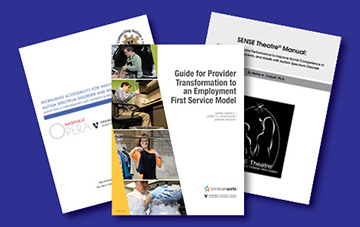Vanderbilt Kennedy Center (TN UCEDD, IDDRC, LEND) Programs SENSE Theatre, TennesseeWorks, and TRIAD Share Key Tools for Program Replication
September 12, 2016

|
Three project replication guides on the topics of community participation through the arts and transitioning practice to community-based employment are now available through the Vanderbilt Kennedy Center for Excellence in Developmental Disabilities (TN UCEDD, IDDRC, LEND).
SENSE Theatre® has developed a complete intervention replication guide, TRIAD has outlined the steps in a successful partnership on community inclusion with the Nashville Opera, and TennesseeWorks has shared a process for providers to transition to integrated and inclusive employment practices.
Intervention Disguised as Theatre
This replication guide outlines the process for facilitating SENSE Theatre®, a community-based intervention that aims to improve the social and emotional functioning and to reduce stress in children with autism through using behavioral and theatre techniques. The model, conceived by Blythe Corbett, Ph.D., associate professor of Psychiatry and a VKC investigator, includes children with autism with trained typically developing youth actors who serve as expert models of social interaction as well as co-actors on the stage.
"Before going to college to become a clinical scientist, I spent many years in the theatre learning about verbal and nonverbal communication, character development, emotional expression, storytelling, and movement," said Corbett. "Acting requires expertise in many of the same skill sets that are significantly delayed or impaired in children with autism spectrum disorders. I began to wonder if the masters of human interaction--actors--could serve as teachers or expert models for youth with autism."
The SENSE Theatre® Manual is intended for professionals or paraprofessionals who have worked with children with autism spectrum disorder. A password-protected online video gallery is included as part of the primary manual, which "shows" the program by providing a clear visual presentation of the core objectives, behavioral techniques, approaches, and examples. Various theatre games are demonstrated and video modeling exemplars are performed. Printable materials, which can be used to support the program, such as guidelines, data collection forms, and exercises, may be viewed and printed.
"I am thrilled about sharing the replication manual," said Corbett. "To date, the intervention has resulted in changes in social perception, an increased ability to identify and remember facial information, a reduction in stress levels, and changes in adaptive skills such as taking care of themselves. Theatre is a powerful tool and proof of the impact that peer-mediated, community-based treatments can have in people with autism."
To learn more about SENSE Theatre®, visit http://sensetheatre.com/
To order the SENSE Theatre® Manual, visit http://sense.vueinnovations.com/licensing/sense-ebook
Transforming Employment Settings
Replication guides allow stakeholders to think through key steps in order to save time, energy, and money. Information in the new Guide for Provider Transformation to an Employment First Service Model, is based on the national model for services that strives toward the full inclusion of people with disabilities through prioritizing community-based employment in an inclusive setting.
The Guide defines and outlines the benefits of the model, lays out key strategies and examples of provider transformation, includes stories from Tennessee employees who have benefited from the Employment First model, and provides resources and materials.
"It is a critical time for providers of employment services to be making this transformation," said Lynnette Henderson, Ph.D., associate director of Adult Community Services at the VKC and a co-author of the guide. "The guide lays out a do-able plan that providers of any size or structure can learn from, emulate, and implement successfully. We hope to see many more people with intellectual disabilities successfully included in their communities through meaningful work alongside their neighbors and friends. The sense of pride, belonging, and worth that comes from this work in the community will be a joy to share!"
The guide was made possible through the collaboration of TennesseeWorks, the Vanderbilt Kennedy Center for Excellence in Developmental Disabilities, Administration on Intellectual and Developmental Disabilities, SRVS of Memphis, Impact Centers, The Arc Tennessee, Tennessee Department of Intellectual and Developmental Disabilities, Administration on Intellectual and Developmental Disabilities, and Office of Disability Employment Policy (ODEP).
To download the free guide, visit http://vkc.mc.vanderbilt.edu/assets/files/resources/providertransformationmanual.pdf
Welcome in the Arts
Nashville Opera and the VKC Treatment and Research Institute for Autism Spectrum Disorders (TRIAD) have partnered since 2013 to increase accessibility and awareness for individuals with autism spectrum disorder (ASD). The collaboration has led to the development of the toolkit, Increasing Accessibility for Individuals With Autism Spectrum Disorder and Related Disabilities: Modifying a Performance and EvidenceBased Supports.
"This toolkit was developed as a resource for other opera associations in North America," said Lauren Weaver, M.S., BCBA, TRIAD Organizational Outreach coordinator. "It allows other associations to develop supports and implement a modified performance to reach out to the ASD community. The impact of this program in the Middle Tennessee community is extensive, but the addition of the toolkit to replicate this work is significant. The tips are transferrable and applicable to other types of performing arts organizations as well."
The three major components to the Nashville Opera and TRIAD partnership are trainings for young artists, opera staff, and caregivers; development of research-based tools for school-based and other community performances; and in-theatre modified performances for families. The toolkit provides tips and tools needed to make community participation in the arts more accessible for individuals with ASD and their families.
To learn more about the TRIAD Organizational Engagement Program, visit http://vkc.mc.vanderbilt.edu/vkc/triad/orgengagement/
To download the toolkit, visit http://vkc.mc.vanderbilt.edu/vkc/triad/ceiresources/opera/







